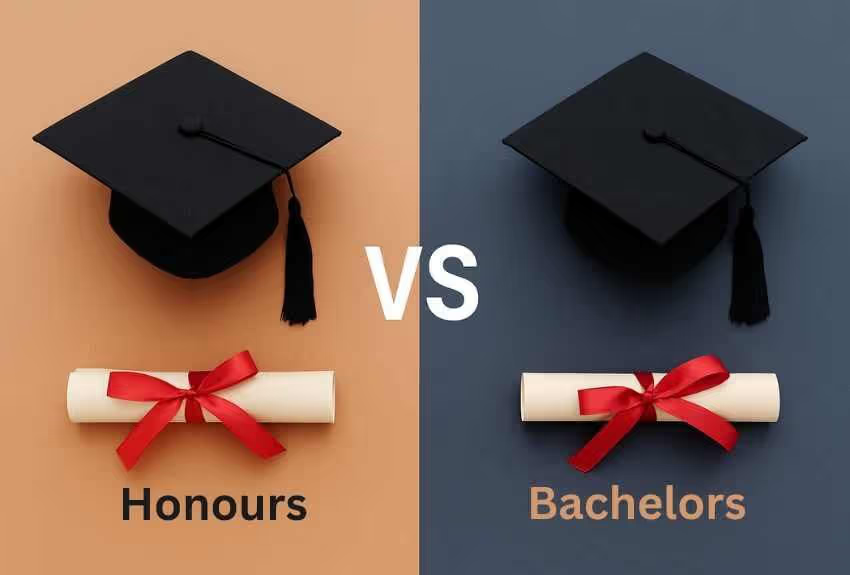Difference Between B.Sc. and B.Sc. Hons often leaves students scratching their heads. If you’ve just finished Class 12, you’re not alone—thousands face this same dilemma every year. At first glance, it might seem like just one extra word, “Honours”, but that single word can make a big difference. It can shape your academic depth, research opportunities, and even your edge in the job market. Whether you’re planning for an M.Sc., preparing for UPSC, or aiming for a career in fields like data science, the choice you make today can influence how universities and employers view your degree tomorrow. Let’s break it down in a clear, practical way.
What is a B.Sc Degree? Difference Between B.Sc. and B.Sc. Hons Explained
B.Sc – Full Form and Core Structure
B.Sc (Bachelor of Science) is a 3-year undergraduate degree that focuses on core science subjects. Students can specialize in fields like Physics, Chemistry, Mathematics, Biology, or Computer Science. The program is designed to build a strong scientific foundation across multiple disciplines, preparing graduates for advanced studies or diverse career opportunities.
Explore More: Difference Between BS and B.Sc.: Which One Is Better?
Curriculum Focus and Flexibility
B.Sc curriculum provides greater flexibility through electives and general papers, making it ideal for students who want broad exposure across streams before choosing a specialization. It carries less academic intensity than a B.Sc (Hons) program, yet still equips you for postgraduate studies, government exams, or skill-based career paths.
What is a B.Sc (Hons) Degree?
B.Sc (Hons) – Full Form and Core Structure
B.Sc (Hons) is a Bachelor of Science (Honours) program that lets you specialize in a subject right from Day 1. Instead of just covering the basics, you dive deep into advanced concepts and focused coursework. For instance, a B.Sc (Hons) in Physics emphasizes intensive study of core physics topics. If you’re aiming for a future-ready honours degree, IIT Jodhpur’s B.S/B.Sc in Applied AI & Data Science stands out with industry-integrated learning designed for tomorrow’s tech careers.
Curriculum Rigor and Depth
B.Sc (Hons) is more research-focused and academically rigorous compared to a general B.Sc. The program typically includes dedicated projects, theory-intensive papers, and in some cases, a thesis component. It is the preferred choice for students aspiring to pursue an M.Sc, secure research assistantships, or obtain academic fellowships. Many top universities, including Delhi University, give higher priority to B.Sc (Hons) graduates for postgraduate admissions.
What Is a BS Degree and How Is It Different from B.Sc. in India?
BS (Bachelor of Science) is a 4-year, research-driven degree aligned with global—especially US—academic standards. Leading institutions like IISc Bangalore, IIT Madras, and IIT Hyderabad offer BS programs in fields such as Data Science, Physics, and Mathematics. Unlike the traditional B.Sc., the BS blends core sciences with electives, research credits, and often industry internships. The goal is to produce globally competitive graduates who can seamlessly pursue Ivy League MS programs or high-impact R&D roles in technology and biotech. In essence, it’s India’s answer to the American undergraduate model—combining depth, flexibility, and global recognition.

Key Differences Between B.Sc and B.Sc (Hons)
At a glance, both are 3-year undergraduate science degrees, but they differ greatly in structure, depth, and academic purpose. Here’s a clear comparison to help you decide which path fits best.
Which One is Better for Jobs and Higher Education?
Career Scope After B.Sc
General B.Sc can open pathways to careers in education, laboratory assistance, government services, and technical support. However, for competitive or specialized fields such as data science, biotechnology, or research and development, pursuing a Master’s degree or diploma is often essential. A B.Sc serves as a solid foundation, offering flexibility to upskill later through domain-specific certifications. On its own, though, a plain B.Sc may hold limited value in today’s competitive job market. Recognizing this, institutes like IIT Jodhpur now offer specialized programs such as the B.Sc in Applied AI & Data Science, which combine academic rigor with industry-ready skills for careers in AI, data science, and analytics.
Career Scope After B.Sc (Hons)
B.Sc (Hons) signals subject mastery—a credential highly valued by employers and academic institutions alike. It gives you a competitive edge for roles in research labs, analytics, scientific communication, and higher education. The degree also strengthens your chances of clearing exams like CSIR-NET, GATE, and postgraduate admissions. For those aiming at global universities or prestigious scholarships, a B.Sc (Hons) adds greater credibility to your profile.
Which One Should You Choose?
Choose B.Sc If:
- You're still exploring what interests you across Physics, Math, Chemistry, etc.
- You value flexibility and want to experiment with electives and interdisciplinary subjects.
- You plan to pursue civil services, banking exams, or non-STEM roles after graduation.
- You’re considering job-oriented certifications (e.g., data analytics, lab tech) post-degree.
Choose B.Sc (Hons) If:
- You already know your core interest—like Physics, Botany, or Computer Science.
- You're aiming for an M.Sc, research role, or academic career in your subject.
- You want a degree that carries more academic weight for global universities.
- You’re prepared to handle a more demanding, subject-heavy curriculum.
- You want to pursue high-impact, tech-driven careers through applied learning.
- For example, IIT Jodhpur’s Applied AI & Data Science B.Sc is tailored for industry needs in emerging technologies.
University Recognition and Industry Perception
B.Sc (Hons) is often the preferred choice at top universities like Delhi University, Jadavpur University, and JNU, where postgraduate admissions value its academic rigor and subject depth. Entrance criteria frequently give higher weight to Hons degrees for their stronger specialization and alignment with advanced study. In the job market, especially across science, data, and R&D roles, recruiters see B.Sc (Hons) as a competitive credential that reflects focus, expertise, and readiness for technical or research-driven work. Even in private sector hiring, candidates with B.Sc (Hons) often qualify faster for interviews in core science domains. It’s not just about marks—it’s about how deeply you’ve mastered your subject.
Conclusion: Final Takeaway
Difference Between B.Sc. and B.Sc. Hons isn’t about competition—it’s about purpose. A B.Sc. gives you breadth, while a B.Sc. (Hons) dives deeper into specialization. If you’re still exploring, a B.Sc. is the flexible choice. But if you’re focused and future-ready, B.Sc. (Hons) offers the edge. In the end, your degree should match your long-term academic and career goals—because in the real world, clarity matters more than convention.
tl;dr
- B.Sc is a general science degree ideal for students exploring multiple subjects or preparing for competitive exams.
- B.Sc (Hons) offers deep specialization in one subject—better for research, M.Sc, and technical job roles.
- Curriculum: B.Sc is broad and flexible; B.Sc Hons is focused and academically rigorous.
- Postgrad Admissions: Universities often prefer B.Sc Hons due to subject depth and research exposure.
- Jobs: B.Sc Hons graduates typically get better opportunities in core science and analytics roles.
- Choose B.Sc if you want flexibility and are still deciding your path.
- Choose B.Sc Hons if you're confident about your interest and want subject mastery.
- There's no universally “better” option—choose based on where you want your degree to take you
FAQ: BSc vs BSc (Hons)
What is the difference between BSc and BSc (Hons)?
BSc (Hons) often involves a more rigorous or specialized curriculum with higher credit requirements, deeper academic or research focus, and sometimes a thesis or project component compared to regular BSc.
Does BSc (Hons) take longer than BSc?
Not usually. Both degrees generally take the same duration (3–4 years) in many systems. But in some colleges, the Honours version may include additional coursework or research components.
Is BSc (Hons) better than BSc?
“Better” depends on your goals. BSc (Hons) may provide more specialization, research opportunities, or prestige, which can help in academic, research, or competitive job paths. Regular BSc may be more flexible in subject combinations.
Can I pursue higher studies (MSc, PhD) with a regular BSc?
Yes. In many institutions, you can pursue postgraduate degrees with a regular BSc, provided you meet subject prerequisites and academic criteria. But BSc (Hons) may offer slight advantages in research readiness.
Are the eligibility requirements different for BSc (Hons)?
Sometimes yes. BSc (Hons) might require higher cutoffs, stronger subject specialization (e.g. only physics/chemistry stream), or entrance exam performance.







.avif)
